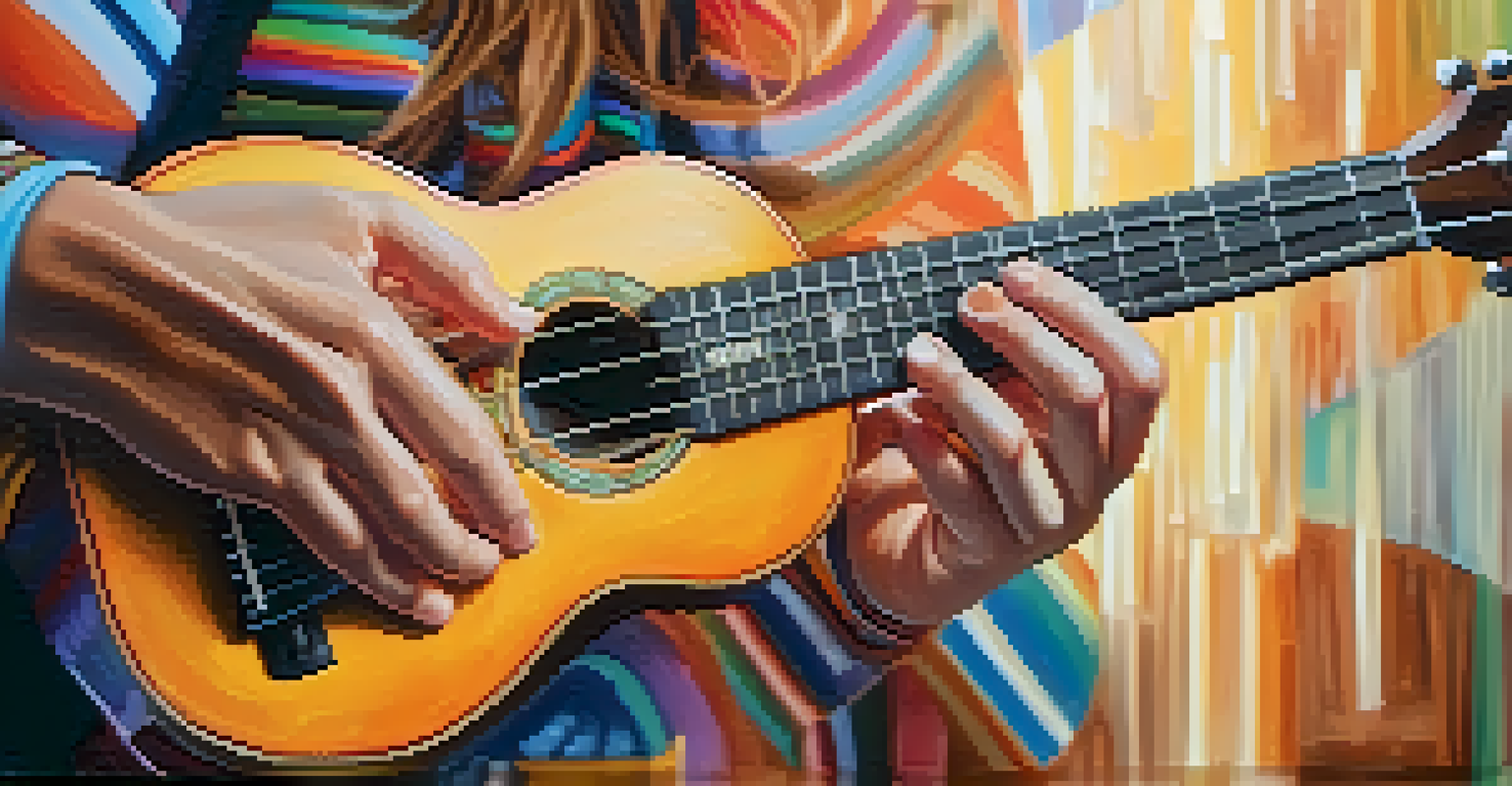Group Ukulele Playing: A Fun Way to Meet New Friends

What Makes the Ukulele a Great Group Instrument?
The ukulele is known for its cheerful sound and approachable nature. With just four strings, it's easier to learn than many other instruments, making it a perfect choice for beginners. This simplicity allows people of all ages to pick it up quickly and join in the fun.
Music can change the world because it can change people.
Moreover, its light weight and portable size mean you can easily bring it to gatherings, whether it's a backyard barbecue or a community center. Imagine strumming along with friends, creating a joyful atmosphere wherever you go. This accessibility is key in making music a shared experience.
When you play the ukulele in a group, it encourages collaboration and camaraderie. Everyone can contribute, whether by singing, playing, or just enjoying the music. This creates a sense of belonging that can be hard to find in our busy lives.
Building Connections Through Music
Playing ukulele in a group setting opens the door to meeting new people. As you learn songs together, you share laughter and experiences that help break the ice. Music has a unique way of bringing people together, transcending barriers like age, background, or skill level.

Consider a local ukulele club where members gather weekly. Each session not only focuses on learning new tunes but also on sharing stories and experiences. These interactions foster friendships that often extend beyond music, leading to a supportive community.
Ukulele: A Perfect Group Instrument
With its simple four-string design, the ukulele is easy to learn, making it an ideal instrument for group play and social gatherings.
In a world where technology often isolates us, group ukulele playing provides a refreshing, face-to-face connection. It encourages socialization and teamwork, which can be incredibly rewarding for those looking to expand their circle of friends.
The Joy of Collaborative Learning
Group ukulele playing is an excellent way to learn collaboratively. When you practice with others, you can share tips and techniques that enhance your playing skills. This mutual support creates a positive environment where everyone feels comfortable learning at their own pace.
The only thing better than singing is more singing.
For example, if one person struggles with a chord, another might step in with a helpful suggestion or demonstrate how to play it. This camaraderie not only boosts confidence but also reinforces the idea that learning is a journey best taken together.
As you progress, you can even work on group performances, which adds an exciting element to your practice. The thrill of playing in front of an audience, no matter how small, can be a bonding experience that strengthens friendships and creates lasting memories.
Creating a Supportive Community
Joining a ukulele group often leads to the formation of a tight-knit community. Members typically support each other, whether that’s through encouraging words during practice or celebrating personal milestones. This sense of belonging can be especially beneficial for newcomers who might feel shy or uncertain.
Many groups plan social events outside of playing sessions, like potlucks or outings to concerts. These activities further enhance the sense of community and help forge deeper connections among members. It’s not just about the music; it’s about building relationships that can last a lifetime.
Building Community Through Music
Playing ukulele in a group fosters connections and friendships, creating a supportive community that extends beyond just music.
Communities formed through music can be incredibly inspiring, as they often foster creativity and collaboration. Group members may even collaborate on original songs, allowing everyone to contribute their ideas and styles, leading to a rich and diverse musical experience.
Finding the Right Group for You
There are many ways to find a ukulele group that suits your interests and skill level. Local community centers, music stores, or online platforms often host gatherings. A quick search could lead you to a welcoming environment where you can start strumming with others.
Don’t hesitate to reach out to different groups to see where you feel most comfortable. Some may focus on casual play, while others might be more performance-oriented. Finding the right fit can make all the difference in your musical journey and social experience.
Additionally, many groups welcome beginners with open arms, providing a supportive atmosphere for learning. Remember, the goal is to have fun and enjoy making music together, so choose a group that aligns with your vibe and values.
The Benefits of Making Music Together
Group ukulele playing offers numerous benefits beyond just learning an instrument. Engaging in musical activities together can reduce stress, improve mental health, and foster a sense of achievement. It’s not just about hitting the right notes; it’s about the joy of creating something beautiful as a team.
Research suggests that making music with others can release endorphins, the brain's feel-good chemicals. This shared experience can lead to laughter and a sense of euphoria, making group sessions something to look forward to each week. It turns practice into a delightful escape from daily worries.
Collaborative Learning Benefits
Group ukulele sessions enhance learning through shared experiences, encouraging mutual support and building confidence among members.
Moreover, the skills you develop while playing in a group—such as listening, patience, and cooperation—are valuable in other areas of life. These soft skills enhance your ability to connect with others, making it easier to form friendships both in and out of the music realm.
How to Get Started with Group Ukulele Playing
Getting started with group ukulele playing is easier than you might think! Begin by picking up a ukulele, which is often affordable and widely available. Familiarize yourself with basic chords and strumming patterns, as these foundational skills will help you stay engaged in group sessions.
Once you're comfortable, look for local groups or online communities that share your passion for ukulele music. Many groups offer beginner-friendly sessions, ensuring you won’t feel overwhelmed. Remember, everyone started somewhere, so don’t be shy about introducing yourself.

Lastly, be open to new experiences and don’t be afraid to make mistakes. The beauty of group ukulele playing lies in the shared journey of learning and enjoying music together. So grab your ukulele, find a group, and let the fun begin!